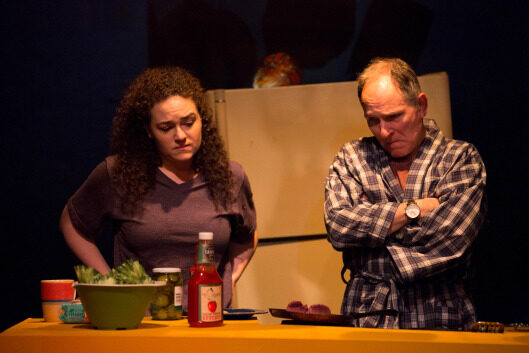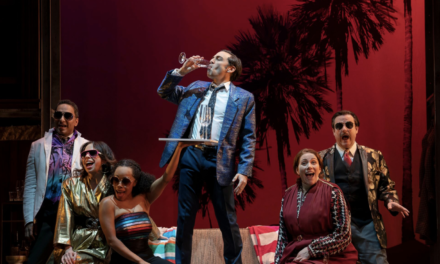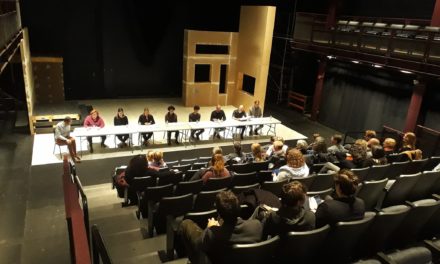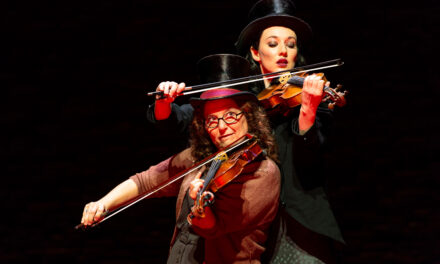Mumburger
The tagline in the publicity for Sarah Kosar’s new play Mumburger reads “a surreal play about grief, parenting, and alternative meat.” You’d be forgiven for hoping–as I’ll confess I was–that the play’s title is a feint and that it has some bait-and-switch up its sleeve that doesn’t involve cannibalism. The title, however, doesn’t lie: ground “mom” meat is indeed on the menu.
How does it get there? Well, eco-activist mom, Andrea has recently died, after her car was crushed by a Birdseye truck on the highway. Her daughter Tiffany (Jessie Wray Goodman) and husband Hugh (Ken Bolden) are trying to cope with her sudden loss, each in their own way, when they suddenly receive a grocery bag full of ground meat patties, with a note from beyond the grave. Andrea had arranged to have her remains delivered to her family as a “digestive memorial,” and she directs her husband and daughter to consume her over the next several weeks (some of the patties are conveniently already pre-frozen so that they can be saved for later).
Hugh and Tiffany are now faced with a dilemma–should they obey “mum’s” wishes (eeuw) or get rid of her in some other manner? Their choice is complicated by the fact that they are vegan: i.e., does the fact that mom is effectively “road kill” make eating her meat okay?
I guess in the real world their choice would also be complicated by all sorts of other logistical questions, like: Who would have processed her remains in such a way, in such a short time, and how could she have arranged it in advance? Would such “meat” even be edible, given that mom has only been dead a day or two, and most meat is aged a couple of weeks before consumption? And how did they fit a whole human’s worth of burgers into such a small grocery bag?
But this play does not take place in the real world, as is evidenced not only by the oddly askew set, in which all of the furniture floats off-kilter in a void (an opposite visual metaphor for the state of sudden grief, from scenic designer Adrienne Fischer), but also by the nonreferential physical vocabulary that director Robyne Parrish imposes on the text. Bolden and Goodman engage in highly formalized movements and gestures–incessantly circling the table, for example, or shoving each other back and forth, or aimlessly shuffling “mum” patties on the kitchen counter–that seem purposely disconnected from the dialogue. The intention may be to underscore the play’s surrealism, but the effect is to make the emotional content of the story harder to access: the characters seem less like real people than like figures under the control of some befuddling force.
I suspect Kosar intends her play to be something of a black comedy, but Parrish’s physical approach to the work gets in the way: I felt I needed to care more about these characters as humans in order to find their situation, off-putting and weird as it is, funny. The most emotionally real moment in the production is also the stillest one: after Tiffany discovers that her dad has consumed all of the remaining burgers and left none for her, they embrace on the floor, Tiffany wailing in uncontrolled grief in his lap as he tries to comfort her. Whether or not you can get on board with the idea that anyone would want to eat her deceased mother in order to keep her memory alive, Tiffany’s anguished realization that her mother is really gone forever resonates deeply.
No real humans are consumed in the course of the performance, but something resembling meat is cooked on stage and eaten, and as icky as the idea of eating a “mumburger” is, even more disconcerting is the fact that the characters don’t spend enough stage time cooking the “meat” to render it safe for consumption. That is, they seem to be eating their “ground mom” raw. All of which is to say: bring a very strong stomach.
The Double Threat Trio
Where Mumburger serves a meal that may not be for all tastes, The Double Threat Trio offers the equivalent of a delectable dessert: it’s sweet, light, and pretty much guaranteed to give you a little dopamine kick.
The premise of this new small musical, which was written and composed by Adam Overett, hearkens back to the gloriously goofy “can-do” spirit of those old Mickey Rooney/Judy Garland films. Jamison (J. Alex Noble) is an actor who can sing, but not dance; Nina (Drew Leigh Williams) is a singer who can dance, but not act, and Kenny (Jerreme Rodriguez) is a dancer who can act, but not sings. Each, in other words, is a “double threat” competing for roles against “triple threat” actor/dancer/singers. What are these poor not-quite-talented-enough performers to do?
Why, put on their own show, of course! They seek out a wealthy writer/director/producer named Millicent (the terrific Michelle Duffy) who just happens to have the perfect vehicle to showcase their talents: “Oed!,” her own musical adaptation of Oedipus Rex. (Yes, you may groan now).
Millicent is a “multi-threat” herself, explaining to the trio that she wears many hats, which turns out not to be an idiomatic expression but a witty comic device. Duffy wheels in a hat rack festooned with different hats, and with each piece of headgear she precisely and lovingly skewers a theatrical stereotype: as the writer, she’s an awkward introvert with buck teeth; as the producer, an aggressive, stooping lech; as the choreographer, an ebullient and overenthusiastic California Valley Girl; as costume designer, a severe Slavic artiste; and as stage manager, a bossy pragmatist. This quick-change routine is uproariously funny, made even more so by the trio’s bewildered acquiescence to Millicent’s outrageous insistence that she be in control of all aspects of the production.
Of course, everything has to go completely awry in the course of putting on the show within the show–and of course, the awryness has to involve each of the characters being compelled to do the one thing they can’t do, and also survive the doing. Meanwhile, along the way Overett sprinkles musical numbers that give a glimpse into each character’s past and add depth to their insecurities and fears. If you’re thinking that this sounds a bit like a stage musical version of Waiting For Guffman you’ve got the right idea: it is simultaneously a lampoon of the people who make the making of theater their business, and love letter to them.
Nothing goes awry in The Double Threat Trio itself, however; on the contrary, director Scott Weinstein shows strong mastery of craft in his staging, and the cast is so fully committed to the peppy zaniness of the premise that you can’t help but cheerily go along for the ride. Overett’s lyrics are chock-full of witty and unexpected rhymes, and he has the good grace not to take himself too seriously, even at one point having Jamison exclaim, apropos Oed!, that “the characters are cartoons!”–a sentiment that could equally apply to The Double Threat Trio. Tony Ferrieri has designed a playful and clever set that manages, with little fuss or muss, to solve the problem of a hall of talking portraits and the destruction of Thebes (if you want to know what I’m talking about, well, you’ll have to see the show for yourself). And while the characters they play may not have the full range of talents, Noble, Williams, and Rodriguez certainly do, and they achieve the difficult feat of singing/acting/dancing both really well and “badly” with considerable panache.
This article was originally posted in The Pittsburgh Tatler on March 10, 2019, and has been reposted with permission.
This post was written by the author in their personal capacity.The opinions expressed in this article are the author’s own and do not reflect the view of The Theatre Times, their staff or collaborators.
This post was written by Wendy Arons.
The views expressed here belong to the author and do not necessarily reflect our views and opinions.


















